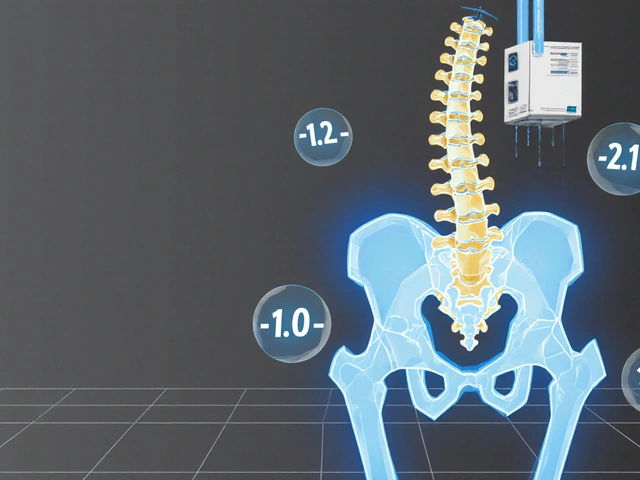If you’ve ever felt like life is a jumble of nervous energy, unexplainable weight changes, or just not quite yourself, you might be experiencing something more than just a hectic schedule. These are some of the telltale signs of Graves' disease, a condition that's often overlooked or misread as just 'being run down'.
Graves’ disease is an autoimmune disorder that leads to hyperthyroidism, or an overactive thyroid. The thyroid, a tiny gland located in your neck, might be small, but it packs a powerful punch when it comes to regulating metabolism. When it's firing on all cylinders due to Graves' disease, life can feel like it’s on fast-forward.
What's fascinating is how the immune system, designed to protect us, mistakenly targets our own thyroid, kickstarting a cascade of symptoms. Understanding this misfire is crucial. We'll unpack how the immune system and thyroid become unlikely enemies in this dance of confusion.
Think it’s easy to spot? Not quite. Symptoms like anxiety, hand tremors, or heat sensitivity can easily be shrugged off as something else, delaying diagnosis. That's why diving deeper into what sets Graves' apart is not just interesting—it’s essential.
Managing life with Graves’ involves more than just popping pills. We'll explore practical tips and lifestyle tweaks that can make a world of difference. And thank goodness for modern medicine—there are several effective treatment options that keep this condition in check.
- What Exactly is Graves' Disease?
- Thyroid & Immune System: The Unlikely Duo
- Common Symptoms You Might Overlook
- Why It's Often Confused with Other Conditions
- Living with Graves': What to Know
- The Latest in Treatment Options
What Exactly is Graves' Disease?
Alright, so Graves' disease might sound mysterious, but let’s untangle it. It’s an autoimmune disease, which means your body's defense system gets a bit mixed up and mistakenly targets your own tissues. In Graves’, the unlucky target is the thyroid gland.
Imagine your thyroid, a tiny butterfly-shaped gland in your neck, is like your body's thermostat. It helps control metabolism, basically your energy burn rate. When it gets extra stimulation from the immune system, it starts working overtime, leading to a condition called hyperthyroidism. This means everything speeds up—heart rate, calories, you name it.
Now, why does this happen? It's kind of like your immune system sees the thyroid as some kind of villain when it's really a misunderstood hero just doing its job. Researchers think there might be genetic factors in play, and some environmental triggers like stress or infections might fuel the fire.
A classic symptom here is the enlargement of that gland, which is often called a goiter. Not only does this add an uncomfortable bulk to your neck area, but it also reminds you something’s off every time you swallow.
You’re not alone if you’ve felt overwhelmed, physically and emotionally. The disease is quite common, especially among women. In fact, women are 7-8 times more likely to develop it than men. Is it any consolation that history's famous folks, like President George H. W. Bush and even the iconic Olympic gold medalist Gail Devers, lived with it too?
Here's some perspective on just how prevalent it is:
| Region | Estimated Prevalence |
|---|---|
| Australia | 1 out of every 200 people |
| United States | About 1.2% of the population |
So, understanding Graves' disease starts with recognizing this autoimmune chaos. And remember, even though it can feel daunting, there are ways to manage and treat it, keeping life on track.
Thyroid & Immune System: The Unlikely Duo
At first glance, the immune system and the thyroid gland should be best buddies, each doing their jobs in harmony. The immune system is all about protection, vigilantly fighting off invaders like bacteria and viruses. The thyroid, on the other hand, is busy regulating metabolism, heart rate, and much more. But in Graves' disease, this partnership takes a bizarre turn.
Imagine you’re at a party, and someone mistakenly bumps into you, thinking you’re the one who spilled their drink. That’s kind of what happens in an autoimmune disorder. The immune system gets confused and targets the thyroid gland, treating it like an unwanted guest. This results in the thyroid producing too much of its hormones, causing hyperthyroidism.
What causes the immune system to lash out like this? It's a combination of genes and environment. There's evidence that if you have a family history of thyroid disorder, your chances of developing Graves' go up. Environmental factors, like smoking or stress, can also light the fuse.
This erratic immune response creates a soup of symptoms, from jitteriness and rapid heartbeat to bulging eyes (yep, it’s called Graves' ophthalmopathy). Once the thyroid's production escalates, it's tough to control without proper intervention.
Interestingly, about 30% of people with autoimmune diseases have multiple issues simultaneously, often with the same rebellious immune system to blame. This makes catching and managing Graves' disease early even more significant.
So, why do other autoimmune diseases not affect the thyroid in the same way? That’s one of the mysteries still being unraveled in labs worldwide. Researchers are keen to pinpoint the triggers and develop new treatments that better target this misfire. But until then, understanding this complex relationship helps us grasp why symptoms arise and what treatment plans make sense.
Common Symptoms You Might Overlook
Graves' disease can be pretty sneaky. The symptoms often whisper rather than shout, making them easy to overlook or dismiss as stress or a busy lifestyle. Knowing what to watch out for can make all the difference in catching it early.
One of the major giveaways is unexpected weight loss, even if you’re eating like usual or more. Your body’s metabolism is cranked up, thanks to this thyroid overdrive. Another sign? A heart that races like it’s in a 24/7 marathon. If your pulse feels like it’s in overdrive, it’s worth a mention to your doctor.
Feeling on edge is another big one. Anxiety and irritability can show up uninvited and stick around, giving off vibes that something isn’t quite right. You might just brush it off as a rough patch, but it's a classic symptom of hyperthyroidism caused by Graves’ disease.
And then there’s fatigue and sleep problems. Your body working overtime can leave you feeling zapped. Even with plenty of shut-eye, the exhaustion lingers. It’s like running on fumes without an obvious reason.
Some folks notice their hands trembling, even when they’re relaxed. This tremor can be subtle but combined with other symptoms, it’s a flag. Then there's the sensitivity to heat. If you're noticing that you can't handle warm temperatures like you used to, your thyroid might be the culprit.
- Unexpected weight loss
- Rapid heartbeat or palpitations
- Increased anxiety or irritability
- Fatigue and sleep issues
- Hand tremors
- Increased heat sensitivity
Having one or more of these symptoms doesn’t automatically mean you’ve got Graves’ disease, but they’re worth discussing with a healthcare professional. A simple blood test measuring thyroid hormone levels can provide clarity. Catching it early opens doors to effective treatments and a return to normalcy.

Why It's Often Confused with Other Conditions
Graves' disease can be a bit of a chameleon. Its symptoms often mimic those of other common conditions, making it tricky to pin down right away. One minute you might feel jittery and anxious, and the next you're sweating more than usual or experiencing a pounding heart. These are classic signs of hyperthyroidism, but they can easily be confused with stress or anxiety disorders, especially in our fast-paced world.
Take heart palpitations, for instance. It's easy to brush them off as just nervousness before a big meeting, right? But if they're happening frequently alongside weight loss or sleep troubles, there could be more going on. And let's not forget about fatigue – something we all battle now and then. Yet, in the case of Graves' disease, this isn't just your typical 'long day at work' tiredness. It's a deeper exhaustion that doesn’t seem to shake off even after a good night's sleep.
One reason this condition often hides in plain sight is the overlapping of symptoms with other thyroid disorders like hypothyroidism, where the gland is underactive. Both conditions can lead to mood changes and energy fluctuations, which makes clear diagnosis challenging without specific tests.
Doctors typically rely on a combination of symptoms, radioactive iodine uptake tests, and blood tests to measure thyroid hormone levels to get to the bottom of things. Here’s a quick glimpse of how Graves' stacks up against similar conditions:
| Condition | Common Symptoms |
|---|---|
| Graves' Disease | Anxiety, weight loss, heat intolerance, hand tremors |
| Hypothyroidism | Fatigue, weight gain, cold intolerance, depression |
| Anxiety Disorder | Nervousness, panic attacks, palpitations |
Knowing the subtle differences can save a ton of time (and stress!). If you or someone you know is dealing with these issues and a standard treatment isn't cutting it, getting checked for Graves' might not just be a good idea—it could be a game-changer.
Living with Graves': What to Know
Lifestyle changes can make a big difference when you're dealing with Graves' disease. While medication and treatments are necessary, your daily habits also play a huge role in managing this condition.
First off, keeping your stress levels in check is vital. Stress can worsen symptoms like anxiety and irritability, so finding ways to relax is key. Whether it's yoga, meditation, or just a walk in the park, incorporating stress-busting activities into your routine can help create a sense of balance.
Diet is another area to focus on. Eating a balanced diet with the right nutrients supports your thyroid and overall health. It's wise to limit foods that can over-stimulate your thyroid, like caffeine and sugary snacks. Lean proteins, fresh fruits, and veggies are your best friends here.
Hyperthyroidism can cause bone thinning, which raises the risk of osteoporosis. Make sure you're getting enough calcium and vitamin D to keep your bones strong. Dairy products, fish, and fortified cereals are good sources.
Getting enough sleep is crucial, too. Thyroid disorders can impact your sleep patterns, so try to maintain a consistent sleep schedule. Sometimes easier said than done, but your body will thank you.
Joining a support group can be incredibly helpful. Connecting with others who understand what you're going through provides emotional support. It's a space to share experiences, tips, and encouragement, which can be comforting.
And of course, keep up with your medical appointments. Regular check-ins allow you and your healthcare provider to monitor your thyroid levels, adjust medications if needed, and catch any potential issues early on.
Remember, managing Graves' disease is a team effort involving you, your healthcare team, and your support network. With the right approach, living with Graves' becomes more manageable, letting you get back to what truly matters in your life.
The Latest in Treatment Options
Treating Graves' disease has come a long way, and there’s more than one path to help manage the condition. The main goal is to tame that overactive thyroid and get those hormones to chill out a bit. You’ve got a few options, and choosing the right one can really depend on your personal health vibe and what your doctor suggests.
First off, antithyroid medications like methimazole, are often the go-to. They work by slowing down the thyroid hormone production, sort of like telling the thyroid to take a breather. For many, this works well and is usually the first line of defense.
Then there's radioactive iodine therapy. It might sound a bit sci-fi, but it’s pretty straightforward. You take a pill, and it slowly shrinks the thyroid by zapping those overactive cells. Most folks see significant results, though it can mean eventually needing thyroid hormone replacement because your thyroid becomes too chilled out.
Surgery, or thyroidectomy, is also an option, although it's typically a last resort. This is where they remove part or all of the thyroid gland. Recovery is usually smooth for most people, but it does involve staying in the hospital and potential need for hormone replacement.
Alongside these, some folks explore complementary therapies like dietary changes or stress reduction techniques to balance out the treatment scene. People talk about cutting out triggers like excess iodine or stress and seeing improvements in symptoms.
Hyperthyroidism can turn into a game of trial and error, so keeping that open line with your healthcare provider is key.








Ted Whiteman July 17, 2025
Honestly, I think a lot of people underestimate just how sneaky diseases like Graves' can be. I'm always skeptical when something gets chalked up to "stress" because, well, stress is such a broad explanation. It’s interesting how your immune system, which should guard you, ends up attacking a crucial gland instead. What’s baffling is why does it specifically target the thyroid? I’d love to see more research on the genetic versus environmental triggers behind this. Has anyone here experienced symptoms that were initially mistaken for something else entirely? This disease seems like a master of disguise.
Dustin Richards July 18, 2025
That’s a very insightful point! From what I understand, the autoimmune response in Graves' disease is triggered by antibodies that stimulate the thyroid uncontrollably. This hyperactivity causes not only physical symptoms like weight loss but also psychological symptoms such as anxiety. The science behind this is quite fascinating because it challenges us to think about how interconnected our immune system and endocrine systems really are.
What I appreciate about articles like this is that they also cover practical management options. Managing the symptoms often requires a multidisciplinary approach including medication, lifestyle changes, and sometimes even surgery. Does anyone have personal experience with specific treatments that have worked well?
Angelina Wong July 19, 2025
I’m glad this article highlights the difference between Graves' and other thyroid disorders because so much confusion exists around that. Graves' disease specifically involves the immune system creating antibodies that mimic TSH (thyroid stimulating hormone), causing excessive hormone production. That’s what sets it apart from hypothyroidism or other thyroid issues.
For those managing Graves', it really helps to monitor your symptoms closely and communicate with healthcare providers regularly. Symptom diaries and tracking anxiety levels or heart rate can be surprisingly helpful. I always recommend patients to cultivate a calm, stress-reducing routine alongside medical treatment — it makes a considerable difference.
Vera REA July 20, 2025
As someone who has known a few family members with Graves' disease, I can confirm how often this condition flies under the radar initially. The symptoms can be so subtle or resemble everyday anxiety and weight changes, especially in busy lives.
This article does a nice job bringing attention to the underlying immunological chaos. From a cultural viewpoint, it’s important for communities to destigmatize thyroid conditions and encourage early screening when anyone feels "off." I'd be interested to hear from others on how cultural perceptions affect diagnosis or treatment in different regions.
Anthony Burchell July 26, 2025
Look, I don’t mean to rain on the parade, but sometimes I wonder if we make too big a fuss about Graves'. Yes, it’s an autoimmune disorder, but autoimmune diseases are everywhere these days, and the treatment basically boils down to managing symptoms. How different is this really from other thyroid issues if the end goal is just hormone regulation? Feels like a lot of scientific jargon that might confuse more than clarify.
Plus, the whole immune system attacking its own body theme? Sounds a bit like a trend rather than a mystery. Has anyone else thought about how much of this is well-established and how much is just medical curiosity chasing its tail?
Patrick Fithen July 29, 2025
There’s definitely something philosophical to unpack here about the body turning against itself, isn’t there? Autoimmunity encompasses a paradox of self-recognition and rejection simultaneously. Why does the immune system view the thyroid as a foe, yet not others? The subtle distinctions within these battles within seem almost poetic.
Moreover, Graves' disease disrupts more than just biological processes; it touches on the identity of health itself. Does understanding this deepen our sensitivity toward such conditions? I think it does, and this article is a valuable step toward that understanding.
Michael Leaño August 1, 2025
This discussion really shines a light on the struggles people face silently. Graves' disease symptoms like sudden weight loss and anxiety can be terrifying and isolating. I'm encouraged by the focus on practical tips for symptom management. Often, optimism and a strong support system make a big difference alongside medical treatment.
For those dealing with this, know that you are not alone and that with the right care, life can remain fulfilling. Has anyone found particular lifestyle changes especially helpful? Sharing those can really empower others in this community.
Anirban Banerjee August 2, 2025
A comprehensive review such as this serves as an essential resource globally, especially where awareness of Graves' disease remains low. The autoimmune dysfunction leading to hyperthyroidism is complex, yet unraveling these mechanisms offers hope for improved therapies.
It is crucial that healthcare professionals emphasize early diagnosis and culturally sensitive patient education. By combining scientific advancement with empathetic care, we can enhance outcomes and quality of life worldwide.
Michael Coakley August 9, 2025
lol gotta love how the immune system just can’t sit still and decides to mess with the thyroid instead. It’s like it’s bored or something. But honestly, the symptoms sound rough af — losing weight and freaking out mentally isn’t a fun combo at all. I wonder how many people just brush off those early signs and end up worse because they think it’s stress or something.
And the treatments? I bet some people overthink it way too much. Just regulate the hormones, chill, and see what sticks, right? Still, gotta admit the fact that our bodies fight themselves is the weirdest thing ever 🤷♂️.
ADETUNJI ADEPOJU August 10, 2025
It is quite fascinating to observe the intricate interplay of immunological factors leading to Graves' disease, yet one cannot overlook the pervasive misinformation that clouds this condition. The terminology, often laden with biomedical jargon, obscures rather than enlightens the average patient, which exacerbates suffering.
Efforts to enhance public understanding must therefore emphasize clarity without sacrificing scientific rigor. Only through such endeavors can patients and caregivers be adequately equipped to navigate the complexities of this autoimmune disorder.
Janae Johnson August 14, 2025
Reading through these posts, I appreciate the depth of knowledge shared, but I also feel that sometimes the emphasis on the "autoimmune mystery" can create unnecessary anxiety for those newly diagnosed. Let’s remember that Graves' disease, while serious, is manageable with proper care and lifestyle adjustments. The narrative should empower patients, not overwhelm them.
Moreover, being skeptical about medical information is healthy, but dismissing symptom severity risks trivialization. Balance is key in how we communicate health information, especially on public forums.